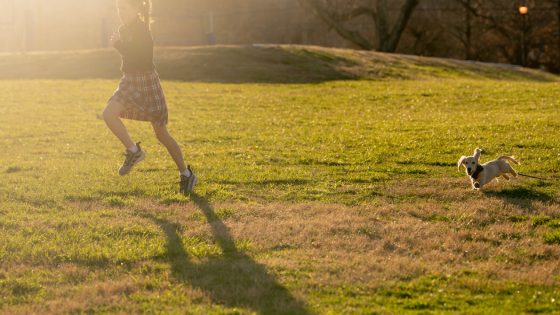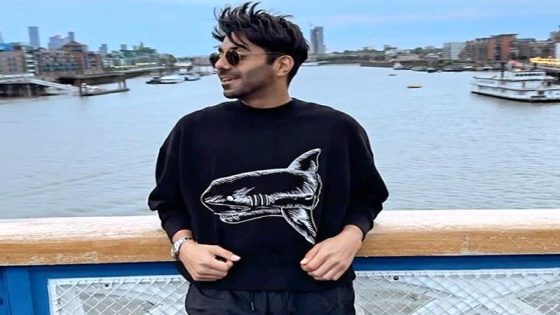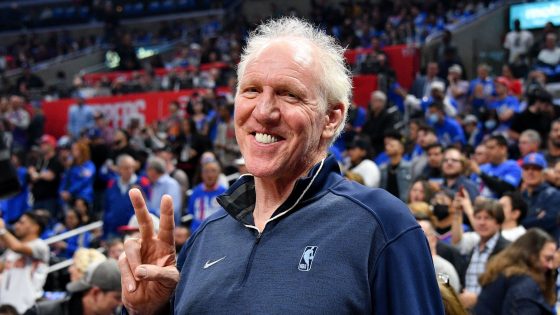Two of April Manning’s children, Mac and Lilah, had just survived the mass shooting at the Covenant School in Nashville. They needed stability and time to grieve.
So she did everything she could to keep the family dog, Owen, their sweet but ailing 15-year-old golden retriever, with them for as long as possible. She pushed back his final trip to the vet, keeping him comfortable as he slowly moved around the house.
Getting another dog was the furthest thing from her mind. But a few weeks after the shooting, her children sat her down for an important presentation.
Prepared with a script and a PowerPoint — “Why We Should Get (Another) Dog” — they rattled through research showing the mental health benefits of having one. It could limit their chances of developing PTSD and help them feel safe. Playing together would get them outside and boost their happiness.
Ms. Manning and her husband considered. Maybe a second dog was possible.
First came Chip, a Cavalier King Charles spaniel. Then, after Owen succumbed to old age, came Birdie, a miniature poodle and Bernese Mountain dog mix. And in taking them in, the Mannings were far from alone.
In the year since Tennessee’s worst school shooting, in which three third-graders and three staff members were killed by a former student, more than 40 dogs have been taken in by families at Covenant, a small Christian school of about 120 families.
“I really only expected them to help in a cuddly kind of way, like just to snuggle the kids when they’re upset,” Ms. Manning said. “But I wasn’t really expecting all the other benefits from them.”
To spend time with the Covenant families is to understand how they have relied on one another, traditional psychological treatments and mental health counseling, and their Christian faith to hold them together.
But it is also to see how often what they needed — a distraction, a protector, a friend who could listen, something untouched by darkness — came from a dog.
An Immediate Response
Dogs greeted the surviving children at Sandy Hook Elementary School as they returned to a refurbished middle school in 2013. A dozen golden retrievers were on hand in Orlando to provide comfort after the deadly attack at a L.G.B.T.Q. nightclub in 2016. The therapy dogs who tended to the surviving students in Parkland, Fla., made the school yearbook.
“Over this period of sort of, 35,000 years, dogs have become incredibly adept at socializing with humans, so they’re sensitive to our emotional state,” said Dr. Nancy Gee, who oversees the Center for Human-Animal Interaction at Virginia Commonwealth University.
Even brief, minute-long interactions with dogs and other animals can reduce cortisol, the body’s stress hormone, research by Dr. Gee and others has shown, providing a possible lifeline for veterans struggling with PTSD and others recovering from trauma.
And on the day of the Covenant shooting, dogs were immediately there to help. Covey, the headmaster’s dog, was at a nearby firehouse, where dozens of staff members and students were evacuated. Squid, a retriever mix, was at the children’s hospital at Vanderbilt University Medical Center, helping to comfort the staff if needed.
When the students who survived were put on a school bus to be reunited with their anguished parents, Sgt. Bo, a police dog, was sitting at their side.
Officer Faye Okert, the dog’s handler with the Metro Nashville Police, handed out a baseball card of dog facts to distract and comfort the children.
“The focus was on him,” said Officer Okert. “You had smiles after what they had been through.”
After families reunited, counselors offered clear advice: To help your child, get a dog. Or borrow a neighbor’s.
That led several parents to connect with Comfort Connections, a nonprofit comfort dog organization. Jeanene Hupy, the group’s founder, had seen firsthand how therapy dogs had helped the Sandy Hook students and started her own organization once she moved to Nashville.
The group, which oversees a menagerie of golden retrievers, a gentle pit bull and a massive English mastiff, began its work by visiting individual homes in the days after the shooting. Then, when students returned to class weeks later, the dogs were once again there.
They were something to look forward to, in the moments when walking through the school doors felt overwhelming. And when there were painful reminders — a water bottle clattering to the floor, an unsettling history lesson on war or the absence of a friend — a child could slip away and cuddle a dog.
As Ms. Hupy put it, something special happens “when you bring in something that loves you more than it loves itself, which is these guys.”
A Reassuring Presence
First it was a joke, then a reality: Everyone was getting a dog.
Fueled by community donations and her own money, Ms. Hupy began connecting several parents and puppies. Even for families who could easily afford a new dog, Ms. Hupy and her trainers dramatically eased the logistical hurdles by finding and training puppies that seemed perfect fits to each family.
The Anderson girls shrieked and cried with joy when they learned they were getting a dog, and have now taught Leo how to flaunt sunglasses and do tricks. The Hobbs children constantly scoop up Lady Diana Spencer, often fashionably dressed in a string of pearls or sweaters.
The dogs are also there in the harder moments, too, like when an ambulance or police car drives by blaring its siren or when the memorial ribbons in their neighborhood remind them of what was lost.
“Sometimes it’s just nice to have a giant soft pillow that doesn’t need to talk to you and just cuddle it,” said Evangeline Anderson, now 11.
And if the dogs chew on a shoe or make a mess on a rug, Ms. Manning said, it is a lesson in how to deal with conflicting emotions.
“We still love them and we’re so glad we have them — both things can be true,” she said. “Just like we can be really nervous about going back to school and still also be excited to do it.”
And maybe, the parents realized, it was not just for the children.
Rachel and Ben Gatlin were driving back from vacation on the day of the shooting. That has meant grappling with the heaviness of survival and knowing that Mr. Gatlin, a history teacher who carried a pistol on his ankle for personal protection, could have run toward the shooter that day.
And while their new dog, Buddy, has adapted to the bossiness of their young children and has developed a penchant for sock consumption, he has also kept the adults’ thoughts focused in the moment. Tending to his needs has served as a reminder of their own.
“When you see it working, you’re in total comfort,” Ms. Gatlin said.
Even the school’s chaplain, Matthew Sullivan, found that the stories of new puppies being shared each day in chapel were “wearing me down in a good way.”
“I kind of wanted to enter into the experience of all these families firsthand,” he said.
Now Hank, a slightly anxious, floppy-eared Scooby-Doo doppelgänger, has been adopted into his home, which had been a little empty without his grown children.
The Alternatives
Not everyone got a dog.
For the McLeans, the solution was two rabbits.
“It’s an incredible distraction to their reality,” Abby McLean said of her children, cupping her hands to mimic cradling a rabbit on her shoulder. “I find myself occasionally doing it as well.”
Another family added Ginny, a tortoise with a possible seven-decade life span, to the mix of animals already in their house.
“For having lost people early in life — there was something that equated to me in that, that there was a longevity to it, to a tortoise,” said Phil Shay, who picked out the tortoise with his 12-year-old daughter, Ever.
Still, the dogs far outnumber the other pets. And every day they can make a little difference.
The first night that George, Jude and Amos Bolton had tried to sleep alone without their parents after the shooting, the slightest grumble from the ice machine or the dryer had been too much. Their mother, Rachel, who had maintained that she liked dogs, just not in her house, soon agreed to take in Hudson, a miniature Goldendoodle puppy with doe-like eyes and wild curls.
“We didn’t realize the dogs could create comfort for people,” Jude, now 10, said, his hands ruffling Hudson’s ears. And when Hudson came home, he added, “he’s just been comforting us ever since.”
It is now easier to sleep through the night, safe with the knowledge that Hudson is there.
“All my friends joke, they’re like, ‘I can’t believe you’re a dog person now,’” Ms. Bolton said. But this dog, she added, “has healed this family.”
Source Agencies



